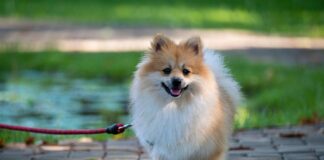Labrador Retrievers are one of the most popular dog breeds worldwide. They are known for their friendly nature, intelligence, and high energy levels. To keep your Labrador healthy and active, providing a balanced and nutritious diet is essential. Proper nutrition plays a significant role in their overall well-being, influencing their weight, coat condition, energy levels, and longevity. In this guide, we will cover essential tips for feeding your Labrador correctly to ensure they lead a healthy life.

1. Understand Your Labrador’s Nutritional Needs
Labradors require a diet rich in high-quality protein, healthy fats, vitamins, and minerals. Their energetic nature means they burn a lot of calories, so they need food that supports their activity level while maintaining a healthy weight.
Macronutrient Breakdown:
- Protein: Supports muscle development and overall body function. Look for high-quality sources such as chicken, beef, fish, and lamb.
- Fats: Provide energy and maintain a healthy coat and skin. Healthy sources include fish oil, flaxseed, and chicken fat.
- Carbohydrates: Supply energy but should be given in moderation. Good sources include sweet potatoes, brown rice, and vegetables.
- Fiber: Helps with digestion and weight management. Found in vegetables, fruits, and whole grains.
2. Choose High-Quality Dog Food
Selecting the right dog food is critical for your Labrador’s health. Here are some tips to ensure you choose the best option:
- Look for high-quality ingredients: The first ingredient should always be a high-protein source, such as chicken or beef.
- Avoid fillers and artificial additives: Steer clear of foods with excessive corn, wheat, soy, artificial colors, and preservatives.
- Opt for breed-specific formulas: Some brands offer food specifically designed for Labradors, ensuring they get the nutrients they need.
- Check for AAFCO approval: The Association of American Feed Control Officials (AAFCO) sets nutritional standards for pet foods. Choose a product that meets these guidelines.
3. Determine the Right Portion Sizes
Feeding your Labrador the correct portion size is crucial to prevent obesity. Labradors are known for their love of food and tendency to overeat, so measuring portions is essential.
Guidelines for Daily Feeding Amounts:
- Puppies (2-12 months): 3-4 meals per day, gradually reducing to two meals.
- Adults (1-7 years): 2 meals per day, with portions based on activity level and weight.
- Seniors (8+ years): Maintain two meals but consider lower-calorie food to prevent weight gain.
Always check the feeding guidelines on your chosen dog food and adjust based on your dog’s weight and activity level. If your Labrador is gaining too much weight, reduce portions slightly. If they are underweight, increase their food intake.
4. Avoid Overfeeding and Obesity
Labradors are prone to obesity, which can lead to serious health issues such as diabetes, arthritis, and heart disease. To prevent weight gain:
- Stick to scheduled feeding times and measured portions.
- Limit treats and table scraps. Treats should not exceed 10% of their daily calorie intake.
- Monitor their body condition. You should be able to feel their ribs without pressing hard but not see them prominently.
- Engage them in regular exercise. Daily walks, playtime, and activities like swimming can help maintain a healthy weight.
5. Provide Fresh Water at All Times
Proper hydration is essential for your Labrador’s health. Always ensure they have access to fresh, clean water. Active dogs may require more water, especially during hot weather or after exercise.
6. Consider Homemade or Raw Diets (With Caution)
Some dog owners prefer homemade or raw diets for their Labradors. While these diets can be beneficial, they require careful planning to ensure balanced nutrition.
- Homemade diets: Should include a mix of protein, carbohydrates, fats, and essential vitamins.
- Raw diets: Must be handled carefully to prevent bacterial contamination. Include raw meat, bones, and organs, but ensure they meet all nutritional needs.
Consult with a veterinarian before switching to homemade or raw diets to ensure they are balanced and appropriate for your dog.
7. Special Dietary Considerations
Labradors, like all breeds, may have specific dietary needs based on health conditions or sensitivities:
- Joint health: Labradors are prone to hip and elbow dysplasia. Consider foods with glucosamine and chondroitin to support joint health.
- Allergies: Some Labradors have food allergies. If your dog shows signs of itching, ear infections, or digestive issues, they may need a hypoallergenic diet.
- Sensitive stomachs: Easily digestible foods with probiotics and prebiotics can help maintain gut health.
8. Adjust Diet According to Life Stages
Your Labrador’s nutritional needs change throughout their life. Here’s what to keep in mind:
- Puppies: Require high-protein and high-fat diets to support growth and development.
- Adults: Need a balanced diet to maintain energy levels and a healthy weight.
- Seniors: May need lower-calorie diets with joint supplements to support aging joints.
9. Monitor Your Labrador’s Health and Adjust Accordingly
Regular vet checkups are essential to monitor your Labrador’s weight, coat condition, and overall health. If you notice changes in appetite, energy levels, or digestion, consult your vet to make dietary adjustments.
10. Healthy Treat Options
While treats should be given in moderation, choosing healthy options can benefit your Labrador:
- Carrot sticks
- Apple slices (without seeds)
- Blueberries
- Plain cooked chicken
- Unsalted peanut butter (in small amounts)
Avoid processed treats with artificial ingredients, excessive sugar, or unhealthy fats.
Conclusion
Proper nutrition is key to a healthy, happy Labrador. By providing high-quality food, maintaining portion control, ensuring proper hydration, and adjusting their diet based on age and health needs, you can support your Labrador’s well-being throughout their life. Regular vet visits and monitoring your dog’s weight and condition will help ensure they stay in optimal health. With a well-balanced diet and plenty of exercise, your Labrador will thrive for years to come.





























